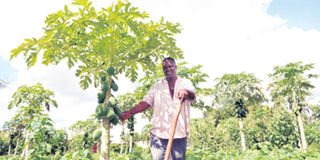Irrigation system for the small farmer

Suleiman Mangore in his farm in Mombasa. Below: A worker sets up a pipe for irrigation. PHOTO | KEVIN ODIT | NATION MEDIA GROUP
What you need to know:
- During planting, he mixes seeds with soil to prevent erosion, then he broadcasts them for germination. The seeds sprout after three days.
- The basin irrigation system has helped him beat erratic rain and the harsh weather.
- When floods affect his crop, Mangore scouts for pests and applies nitrate fertiliser to boost the nutrients.
Suleiman Mangore’s three-quarter-acre farm in Likoni, Mombasa is awash with leafy green amaranthus crops that make many marvel.
Towering above the traditional vegetables, also known as mchicha at the Coast, are healthy pawpaw plants that have yielded several fruits.
Beneath the amaranthus leaves is the secret of the success of Mangore’s venture. Mangore went against the norm in the region to grow the crops under basin irrigation.
Seeds of Gold team finds him in the company of his gardeners, Nyamawi Nyawa and Halima Omar, weeding and preparing water channels that heavy rains had destroyed.
Mombasa County Irrigation Officer Hamisi Mwakibarua explains that basin irrigation is done by creating small channels along the field length in the direction of a slope.
The seedbed, which is divided by furrows called basins, where mchicha is grown is then flooded with water.
SLIGHT SLOPE
“Water, supplied using pipes, is released at the top end of each furrow and it flows down the field under the influence of gravity. The speed of water is determined by a slight slope made on the furrow and soil infiltration rate.”
Mangore has mastered this art and he says he decided to intercrop amaranthus with pawpaw due to increased demand of the two in Mombasa.
“Mchicha fetches good prices at the market and it is not labour intensive like other veges. It only needs manure during planting and weeding, moreover it can withstand harsh weather, pests and diseases.”
His farm is situated 2km from the Indian Ocean and has sandy loam soil. Area agriculture field officer Tabitha Odhiambo says the soil loses water faster making it good for basin irrigation.
“I intercrop the vegetables with pawpaw because the latter shield the amaranthus from the scorching sun. The vegetables, on the other hand, help keep moisture in the soil and prevent erosion,” Mangore says.
During planting, he mixes seeds with soil to prevent erosion, then he broadcasts them for germination. The seeds sprout after three days.
Pawpaw, which is drought-resistant and does not use a lot of water, is planted at a spacing of 3 by 3m.
Mangore says he recovered his Sh65,000 capital used in the setting up of the basin irrigation technology system which involved drilling a borehole, water storage tank, channel and labour, in his third harvest
“I make Sh10,000 a week from mchicha and Sh2,000 from selling pawpaws. I harvest once a week, selling a bunch weighing about 300g at Sh15 to traders. On the other hand, each pawpaw goes from Sh30 to Sh60 depending on the size,” says Mangore, 49, who went into farming after graduating in 1990 with a certificate in general agriculture from Bukura Agricultural Training College and failed to get a job.
He has been keeping poultry for all those years and diversified into amaranthus and pawpaw four years ago.
ERRATIC RAIN
The basin irrigation system has helped him beat erratic rain and the harsh weather.
“The mentality that irrigation is expensive and is only meant for large-scale farmers is wrong. There are simple and cheap irrigation systems that include overhead and basin, which can be used in urban farming,” says Mwakibarua.
Mangore advises that one must watch out during the rainy season when heavy rains cause floods, leading to pests and diseases.
“We stop irrigation for at least two days after heavy rains to allow the seedbed to dry. We then irrigate the crops with the salty well water to prevent amaranthus leaves from turning yellow. The crop may also become stunted for lack of nutrients.”
When floods affect his crop, Mangore scouts for pests and applies nitrate fertiliser to boost the nutrients.
Rainwater flooding normally erodes nutrients on the farm, and dissolves some deeper in the soil.





